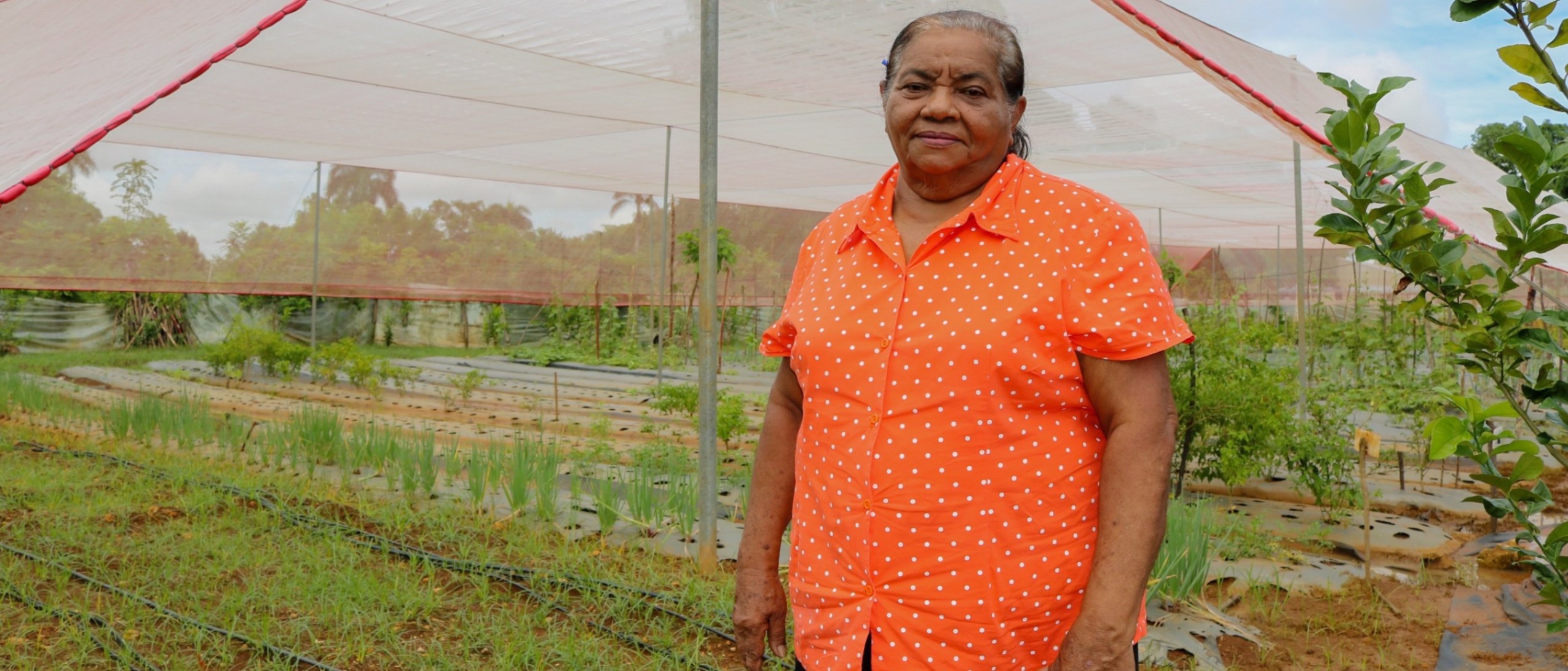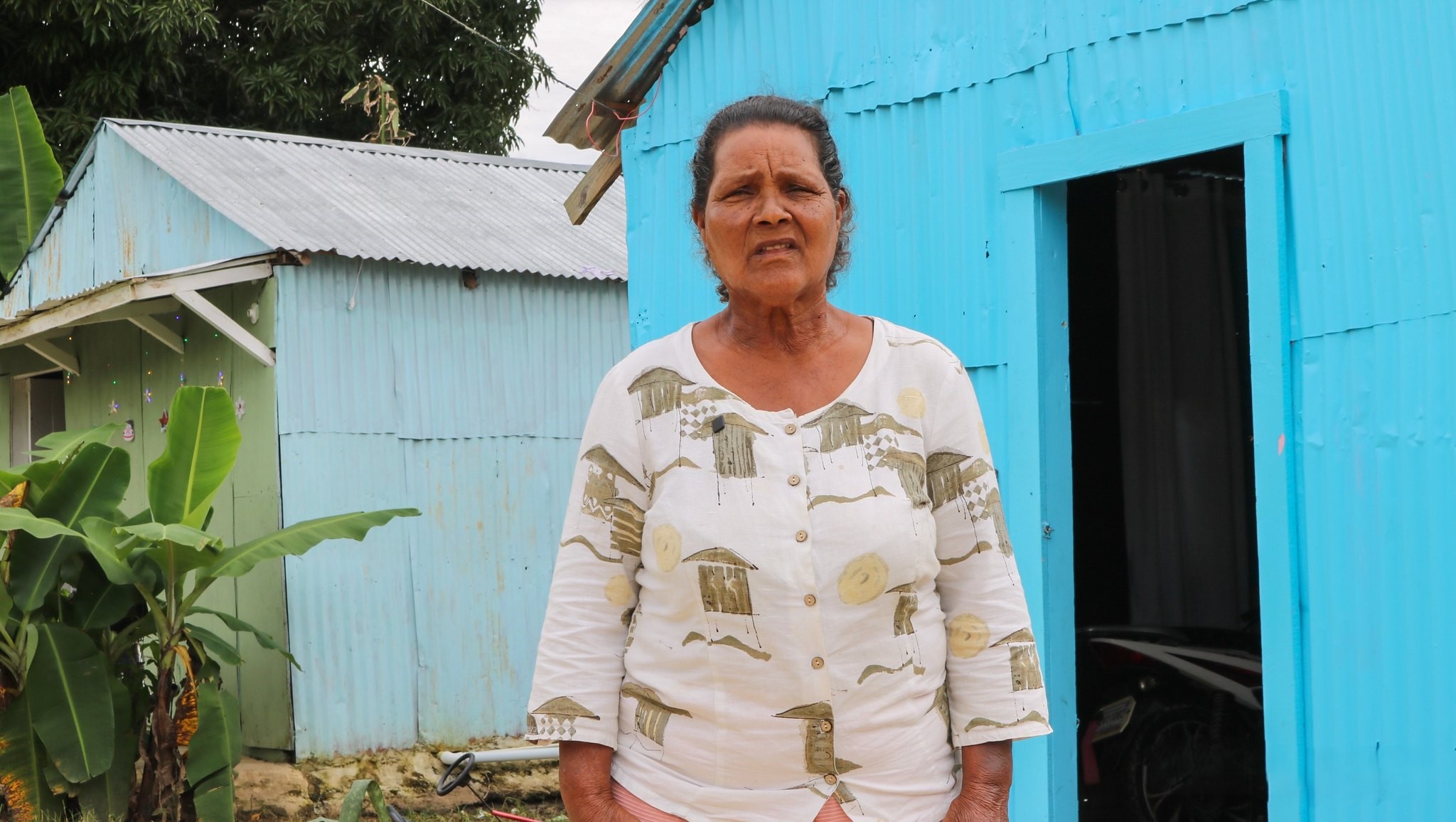
Family farming reaches high-end gastronomy in the Dominican Republic, led by rural women
With the support of FAO, the social protection program Supérate, and Chef Saverio Stassi, a group of Dominican rural women take part in preparing seven-course dinners, bringing the flavors of the Dominican countryside to high-end gastronomy while strengthening their empowerment.
Severa Rodríguez, Sales manager of the Gina Jaragua Cooperative.
©FAO/Constanza Soudy
08/03/2025
At the first light of dawn, Severa Rodríguez (71), sales manager of the Gina Jaragua Cooperative, wakes up in her small shelter in the heart of Higüey, in the province of La Altagracia, Dominican Republic.
Cooking and preparing traditional Creole food are part of her daily routine—one that for years was marked by uncertainty and the constant struggle to provide for her family and community. “I set my goal to make peanut sweets and pumpkin bread to survive because there were no job opportunities”, Severa recalls.
Many of these women faced economic difficulties and limitations in marketing their products. Lack of access to formal markets and limited opportunities to learn new agricultural techniques aggravated their conditions.
“We had to get to know different points and places where we faced the challenge of prices going up and down and the struggle to find a decent market that respects our work as producers,” says Ámbar Rijo (32), marketing manager of the María de la Altagracia Association.
However, everything changed when the Food and Agriculture Organization of the United Nations (FAO), the Government of the Dominican Republic through the social protection program Supérate, the Ministry of Agriculture, the Hunger-Free Mesoamerica Project and the Mexican Agency for Development Cooperation (AMEXCID) intervened through the “Family Agriculture and Rural Development Program: Strengthening productive and organizational capacities for linkage to the tourism market”.
With technical assistance from FAO and program partners, improvements have been made to infrastructure, such as shade houses, the construction of a collection center, and the connection to fair and innovative markets, which has boosted the capabilities and economic, social and political empowerment of rural women, who have managed to improve their income, make their work more visible and strengthen their role as agents of change, achieving a better life.
In 2021, as part of this initiative, the shade houses, a system of sustainable agricultural production in a semi-protected environment where the quantity and quality of light reaching the crops in areas with high solar radiation is regulated, began to change the way women work the land.
.jpg?sfvrsn=830b52af_3)

From left to right, Ámbar Rijo, Marketing Manager of the María de la Altagracia Association and Anacleta Jiménez, President of the Jaguamocha Women's Association. ©FAO/Constanza Soudy.
Equipped with drip irrigation equipment, a seedling bank, a fish pond for more than 2 500 fish, and an electric power plant with solar panels, these structures, in addition to improving production and protecting crops, have become spaces for learning and collaboration.
Thanks to them, the women farmers have not only improved their techniques, but have also strengthened their organization, sharing knowledge and creating support networks.
In mid-2024, another important step made a difference: the inauguration of an agricultural product collection center that today benefits 62 producers. Equipped with specific areas for washing, sorting, and storing vegetable products, the center enables the application of quality standards that were previously inaccessible.
"They help us understand the value of being organized. I learned that if I enrich the soil with organic fertilizer, I can produce healthy food; I didn’t know that before. That’s something I learned," says Anacleta Jiménez (71), President of the Jaguamocha Women's Association.
The community now offers a better quality of vegetables, fish, leeks, beans, among other fruits, vegetables, and animal products, which meet the standards to access high-impact markets such as hotel chains and high-end restaurants.
“Now we are super farmers since we know how to prepare our own fertilizers and pesticides. We have had training, we know how to negotiate our own products, we know what steps to take, thanks to the institutions that have not been supporting us, for us it is an achievement,” says Ámbar.
Severa Rodríguez, Ámbar Rijo and Anacleta Jiménez, were selected to participate in the initiative “Agricultoras en Superación” of the Family Agriculture Program, promoted by FAO, Supérate and the Ajualä restaurant. This innovative instance turns fresh, authentic, and nutritious products harvested b
y the rural women of Higüey into haute cuisine dishes at the prestigious Ajualä restaurant located in the capital, Santo Domingo.
Moving pots and learning new techniques, the farmers watch with pride as their harvests, previously limited to local sales, star in seven-course menus, highlighting their land’s richness.
“They see what we transform, but without them, we are nobody. Restaurants would not exist without them, they are part of us, our backbone,” says Saverio Stassi, chef at Ajüalá Restaurant.
“This is not a question of numbers or costs, it is a matter of only one reason: desire. When you enter this cycle and manage to have contact with people who make what you do possible and have the power in their hands to improve your cooking, it creates a wonderful bubble that once you enter, you can't get out,” he reflects.
-(1).jpg?sfvrsn=70fadaf1_3)
Dinner of the “Agricultoras en Superación” initiative at Ajüalá restaurant. ©Courtesy of Supérate.
After two years of implementation, the Agricultoras en Superación initiative has directly impacted 36 women farmers in the Dominican Republic, strengthening their role in the agrifood value chain.
These women not only sell their products at fair prices but also receive a percentage of the profits generated by the culinary experiences at the Ajualä restaurant. This model enhances their income, recognizes the value of their work, and reinforces their economic and social empowerment.
“They paid us money for the products we brought, we were happy. We got together, did the math and paid each one for the products. From the profits they gave us privately and from the ones we sold, we divided them among all of us,” she says.
“It was a very nice experience. We learned a lot, we made known the fruits and the life of us rural women. We had contact with many people who might be interested in buying from us in the future,” she says sternly.
“I have that photo on my phone and I look at it every now and then and I live that, that joy, the beautiful thing was to take all those products and see how people enjoyed them. We brought eggs, milk, beans, cassava, yams, yams, leeks and potatoes”, recalls Severa.
Today, these women see a better life and a brighter future for themselves and their communities thanks to the support of FAO, Supérate, Ajualä restaurant and partners, promoting food security and nutrition and strengthening their local economies.
Through strategic partnerships and collective efforts, FAO continues to work to ensure that rural women have the tools they need to lead, innovate and thrive, moving towards more inclusive, sustainable and resilient agrifood systems, leaving no one behind.
“It’s an experience I will never forget. The service we provided and what we offered led to more sales and greater publicity. It was a wonderful night. I always carry it in my heart, telling my children and all of you how grateful I am every single day,” says Anacleta, moved.
